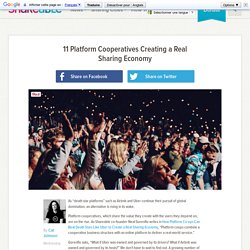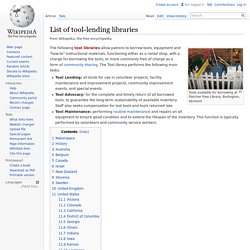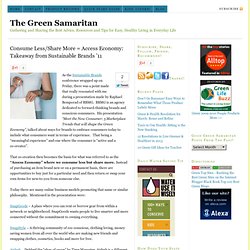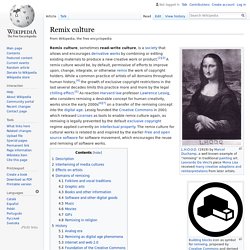

11 Platform Cooperatives Creating a Real Sharing Economy. As “death star platforms” such as Airbnb and Uber continue their pursuit of global domination, an alternative is rising in its wake.

Platform cooperatives, which share the value they create with the users they depend on, are on the rise. As Shareable co-founder Neal Gorenflo writes in How Platform Co-ops Can Beat Death Stars Like Uber to Create a Real Sharing Economy, “Platform coops combine a cooperative business structure with an online platform to deliver a real-world service.” Gorenflo asks, “What if Uber was owned and governed by its drivers?
What if Airbnb was owned and governed by its hosts?” We don't have to wait to find out. 1. Fairmondo is a digital, co-operative version of eBay, where sellers on the platform are also its owners. To scale globally, the Fairmondo team plans to create an international network of country-based co-ops feeding into the Fairmondo platform. 2. Stocksy is a stock photo site where contributing photographers are also owners. 3. List of tool-lending libraries. Tools available for borrowing at Fletcher Free Library, Burlington, Vermont The following tool libraries allow patrons to borrow tools, equipment and "how-to" instructional materials, functioning either as a rental shop, with a charge for borrowing the tools, or more commonly free of charge as a form of community sharing.

The Tool library performs the following main tasks: Tool Lending: all kinds for use in volunteer projects, facility maintenance and improvement projects, community improvement events, and special events.Tool Advocacy: for the complete and timely return of all borrowed tools, to guarantee the long-term sustainability of available inventory. Staff also seeks compensation for lost tools and tools returned late.Tool Maintenance: performing routine maintenance and repairs on all equipment to ensure good condition and to extend the lifespan of the inventory. This function is typically performed by volunteers and community service workers. Makerspace[edit] History[edit] Empowered People and Resilient Brands. Why The Collaborative Economy Is Changing Everything. Empowered People and Resilient Brands.
Food Sharing. Consume Less/Share More = Access Economy: Takeaway from Sustainable Brands ’11. As the Susta inable Brands conference wrapped up on Friday, there was a point made that really resonated with me during a presentation made by Raphael Bemporad of BBMG.

BBMG is an agency dedicated to forward-thinking brands and conscious consumers. His presentation “Meet the New Consumer: 5 Marketplace Trends that will shape the Green Economy”, talked about ways for brands to embrace consumers today to include what consumers want in terms of experience. That being a “meaningful experience” and one where the consumer is “active and a co-creator”. That co-creation then becomes the basis for what was referred to as the “Access Economy” where we consume less but share more. Today there are many online business models promoting that same or similar philosophy. SnapGoods – A place where you can rent or borrow gear from within a network or neighborhood.
Airbnb – Dubbed the “ebay of space” by Time Magazine, Airbnb is a different concept for booking a place to stay when you travel. Sharing economy. Remix culture, sometimes read-write culture, is a society that allows and encourages derivative works by combining or editing existing materials to produce a new creative work or product.[2][3] A remix culture would be, by default, permissive of efforts to improve upon, change, integrate, or otherwise remix the work of copyright holders.

While a common practice of artists of all domains throughout human history,[4] the growth of exclusive copyright restrictions in the last several decades limits this practice more and more by the legal chilling effect.[5] As reaction Harvard law professor Lawrence Lessig, who considers remixing a desirable concept for human creativity, works since the early 2000s[6][7] on a transfer of the remixing concept into the digital age. Lessig founded the Creative Commons in 2001 which released Licenses as tools to enable remix culture again, as remixing is legally prevented by the default exclusive copyright regime applied currently on intellectual property.